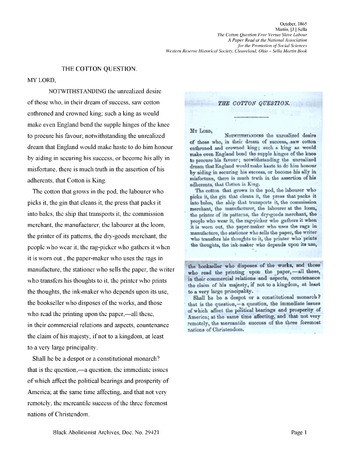(page1).jpg.jpg)
Title: Colored American - April 11, 1839
Speaker or author: editor
Newspaper or publication: Colored American (1837 - 1842)
The writer lists the benefits of the Colored American newspaper, and offers its pledge to continue to serve the African American community.
Description of file(s): one scanned, two columned, newspaper page
(page1).jpg.jpg)
Title: Colored American - June 2, 1838
Speaker or author: editor
Newspaper or publication: Colored American (1837 - 1842)
The writer tells his readers that those opposed to the work of abolitionists have accused them of increasing prejudice. He believes the only change that may be influencing prejudice is that the rights provided to African Americans in the past as "favors" are now demanded by them as part of their civil rights as members of a free society. The shift in perspective is proving difficult for some white citizens to make.
Description of file(s): one scanned, two columned, newspaper page

Speaker or author: Booth, E. A.
Newspaper or publication: Presscopy -- Harvard University, Cambridge -- Rare Books and Manuscripts
Speech indicating the goals and determination of African Americans living in Nevada County, California. (Includes MP3 audio file)
Description of file(s): PDF 2 page, 479 word document (text and images)

Speaker or author: Martin, J. Sella (John Sella), b. 1832
Newspaper or publication: Western Reserve Historical Society, Cleveland Ohio -- Sella Martin Book
The speaker traced in detail the benefits and the drawbacks of raising cotton. He stressed the value of the crop itself and its positive influence on the American economy. He linked this with the work of slaves who had given their health and lives to produce it. The remainder of the speech stressed the predicament that the emancipation of the slaves placed on those involved with cotton production. He also emphasized that the Negro was not inferior to the white race and he offered several examples to prove this. He believed the future of the production of cotton and other crops was with science not with "brute" man power. The idea of inferiority of one race was not a sound argument for slavery. He argued for the right of all human beings to be free.
Description of file(s): PDF 13 page, 3,682 word document (text and images)
(page1).jpg.jpg)
Title: Voice of the Fugitive - February 12, 1851
Speaker or author: editor
Newspaper or publication: Voice of the Fugitive (1851 - 1852)
The writer argues against the current notion that people of African descent are mentally inferior to other races. This idea is being used to justify slavery, and the writer argues that it is based on false reasoning.
Description of file(s): two scanned newspaper pages (three columns)
(page1).jpg.jpg)
Title: Voice of the Fugitive - February 26, 1851
Speaker or author: editor
Newspaper or publication: Voice of the Fugitive (1851 - 1852)
The writer continues his commentary concerning the current debate over the perceived inferiority of people of African descent.
Description of file(s): two scanned newspaper pages (three columns)



